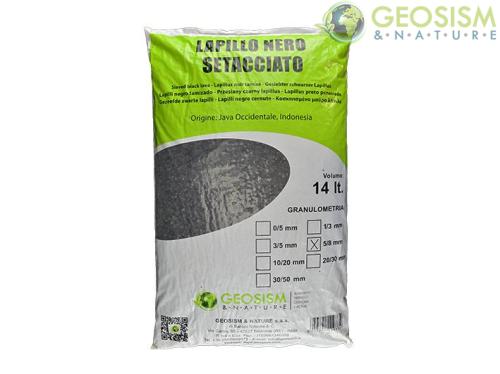Geosism sieved black volcanic lapillus, volcanic lava 5/8 mm (14 lt)
GEOSISM SIEVED BLACK VOLCANIC LAPILLUM, VOLCANIC LAVA 5/8 mm (14 lt) .
Lapillus is an effusive magmatic mineral (vulcanite) naturally calcined at high temperature, porous, insulating, light .
P omice and lapilli are the product of explosive volcanic eruptions formed following a violent expansion of gases dissolved in lavas of acidic chemical composition: the rapid cooling of the rock prevented its crystallization, trapping the gases inside and generating honeycomb minerals expanded in a more or less concentrated manner.
In fact, during the solidification phase, the vapors present in the magma, suddenly released, caused the swelling of the entire mass of the magma and it is during this rapid cooling phase that the differences in the physical structure of the various volcanic aggregates were determined: the volcanic lapilli it was formed from a magma with a lower silica content.
The lower viscosity and the slower cooling of the lava facilitated the escape of a certain quantity of the gases present in the magma.
Minerals were formed characterized by voids with an average diameter greater than those of pumice but of a decidedly lower number.
CHEMICAL-PHYSICAL CHARACTERISTICS
pH: 7 - 8;
NON-TOXIC PRODUCT: (free from crystalline free silica) .
MEDIA CHEMICAL ANALYSIS
SiO 2 : 52.57%;
Al 2 O 3 : 18.05%;
MnO 2 : 4.9%;
Fe 2 O 3 : 10.38%;
CaO: 10.02%;
Na 2 O: 0.79%;
TiO 2 : 1.41%;
MgO: 4.04%;
Cr 2 O 3 : 0.01%;
2 O: 1.66%.
IDEAL FOR
? Rooting cultural substrates;
? Draining substrates for sports fields (football, tennis, etc.);
? Stabilized draining for clay surfaces;
? Mulches;
? Preparation of potting mixes;
? Soilless crops;
? Thermal and acoustic insulation;
? Soil amendment;
? Mineral layer for bio-filtration.
N B: NEWS ON COLOR AND CONTENT
Please note that the color of the material is variable. It depends on many factors including: the extraction point in the quarry and the humidity contained. The color varies from greyish-black (when the product is totally dry) to intense black (when the product is humid or wet). It is not possible, in any way, to choose between these colors which are found without distinction inside the product. The secondary photograph of this listing, where the product is held in the hand, demonstrates the variability of the shades. By observing advertisements with grain sizes different from this one, it is possible to appreciate the color variations which are mainly given by the degree of humidity of the material at the time the photograph was taken.
It should also be noted that given the particular origin of the product, it may contain small traces of plant roots.














